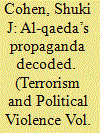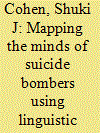| Srl | Item |
| 1 |
ID:
159888


|
|
|
|
|
| Summary/Abstract |
We describe a novel hybrid method of content analysis that combines the speed of computerized text analysis with the contextual sensitivity of human raters, and apply it to speeches that were given by major leaders of Al-Qaeda (AQ)—both in its “core” Afghanistan/Pakistan region and its affiliate group in Iraq. The proposed “Ideology Extraction using Linguistic Extremization” (IELEX) categorization method has acceptable levels of inter-rater and test-retest reliabilities. The method uncovered subtle (and potentially non-conscious) differences in the emphases that Usama Bin Laden and Ayman Al-Zawahiri put on the various components of their ideological justification for terrorism. We show how these differences were independently recognized as the crux of the rift in AQ, based on documents that were confiscated in Abbottabad following Usama Bin Laden’s assassination. Additionally, several of the ideological discrepancies that we detected between AQ “core” and its Iraqi affiliate correspond to schisms that presumably led to the splintering of AQ Iraq and the rise of ISIS. We discuss IELEX’s capability to quantify a variety of grievance-based terrorist ideologies, along with its use towards more focused and efficient counter-terrorism and counter-messaging policies.
|
|
|
|
|
|
|
|
|
|
|
|
|
|
|
|
| 2 |
ID:
144897


|
|
|
|
|
| Summary/Abstract |
This study proposes a novel methodology for the study of the mindset, motives, and cognitive style of individual suicide bombers in Israel/Palestine, based on a comprehensive corpus of personal farewell letters (which also serve as last wills) that were written by suicide bombers to their family during the Second Intifada (2000–2006). To avoid privileging certain a priori sentiments, motivations, or concepts over others, I used a programmatic “bottom-up” sequence of quantitative psycholinguistic procedures, in which prominent themes or concepts from one level of analysis are further qualified and contextualized in the next. This afforded a minimally biased view of the cognitive content of Palestinian suicide bombers, including the sentiments, motivations, and concepts that they were more preoccupied with, and the context in which these ideas were expressed. The results are largely consistent with theories of political violence that place pro-social sentiments at the forefront of the motivations for suicide terrorism, and paramount to antisocial sentiments such as hatred and revenge. Since the linguistic patterns that were uncovered in this analysis cannot be controlled consciously, and the farewell letters of suicide bombers have rarely been rigorously analyzed linguistically, this study may provide an unprecedented glimpse into the cognitive style and content of individual suicide bombers—a glimpse that is minimally biased by political, partisan, or sectarian preconceptions.
|
|
|
|
|
|
|
|
|
|
|
|
|
|
|
|